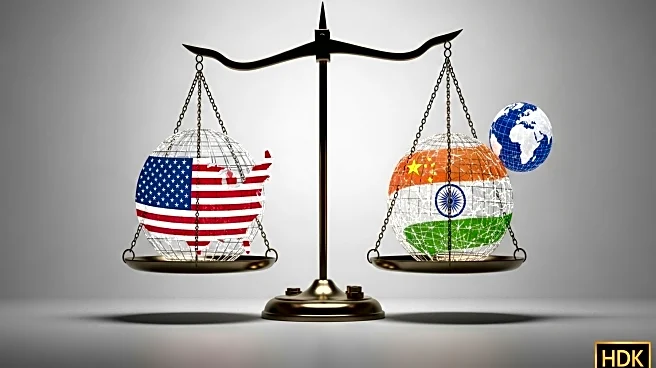What is the story about?
What's Happening?
India has declined the United States' demands for a unilateral trade deal, a stance that contrasts with the approaches taken by the European Union and Japan. This development was highlighted by former Indian Ambassador to the U.S., Arun K. Singh. Despite the U.S.'s mixed signals towards New Delhi, the two countries have been collaborating on various fronts. The U.S. views India as a crucial partner in maintaining its technological edge, especially in light of the growing competition with China in both military and technological arenas. This refusal comes amidst a backdrop of the U.S. imposing tariffs on India, partly due to India's purchase of Russian oil, which has adversely affected Indian businesses.
Why It's Important?
The refusal by India to accede to U.S. demands for a unilateral trade deal underscores the shifting dynamics in global trade and geopolitics. As the U.S. seeks to counter China's influence, India emerges as a pivotal player in technological innovation and strategic partnerships. This decision could impact U.S. businesses looking to expand in India and may influence the broader geopolitical landscape, as India balances its relationships with major powers. The imposition of tariffs by the U.S. could strain economic ties, affecting industries reliant on bilateral trade. The EU's contrasting approach, aiming to draw India away from Russian influence, highlights the complex interplay of global alliances.
What's Next?
The ongoing collaboration between the U.S. and India on various fronts suggests that despite the current trade disagreements, both nations may continue to seek common ground in areas of mutual interest, such as technology and defense. The U.S. may need to reassess its trade strategy with India to foster a more balanced and mutually beneficial relationship. Additionally, India's strategic decisions will likely continue to be influenced by its need to navigate its relationships with both the U.S. and China, as well as its economic ties with Russia.
Beyond the Headlines
India's stance on the trade deal reflects its broader foreign policy strategy of maintaining strategic autonomy and balancing its relationships with major global powers. This decision may also signal India's intent to assert its economic sovereignty and negotiate trade agreements that align with its national interests. The broader implications of this development could include a reevaluation of trade policies by other nations seeking to engage with India, as well as potential shifts in global supply chains.


















